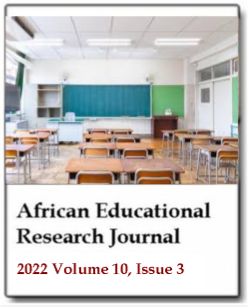A voice of resistance and activism: A critique of Imbolo Mbue’s How Beautiful We Were
Teresia Muthoni Biama, Selline A. Oketch and Caroline Kinuu KimathiAfrican Educational Research Journal
Published: September 12 2022
Volume 10, Issue 3
Pages 312-320
DOI: https://doi.org/10.30918/AERJ.103.22.044
Abstract
This article focused on the voice of resistance and activism in Imbolo Mbue’s How Beautiful We Were (2021). The novel voices the environmental injustices and the disastrous consequences of oil corporations. The people of Kosawa know that something is wrong with the land they’re living on. They receive acid rain, rivers have grown sickly green, and people are dizzy with the diseases. They also know that Pexton, the oil company is to blame for their loss of life and livelihood. The natives decide to rise up and fight back against an American Oil Company that has been polluting the land. This study investigated how this ecological destruction in Kosawa has triggered eco-activism and resistance from the natives. The study used the qualitative approach employing an analytical research design comprising research methods of content analysis and close textual reading. The research was further informed by Lawrence Buell’s (2005) second wave of eco-criticism, which advocates for environmental justice for the victims of environmental degradation. It is also concerned about the destruction of plants and animals. This study depicts eco-criticism as a theory that displays the tools of activism and resistance. The findings of this research show that oil spillage has shattering effects on humans, animals, and aquatic life. The findings also show that the author uses various resistance approaches to fight against environmental degradation such as media, education, revolution, and age mates among others. Mbue’s text calls on the African nations to vehemently resist environmental degradation.
Keywords: Activism, environmental degradation, environmental justice, eco-criticism, ecology, resistance.
Full Text PDFThis article is published under the terms of the Creative Commons Attribution License 4.0

